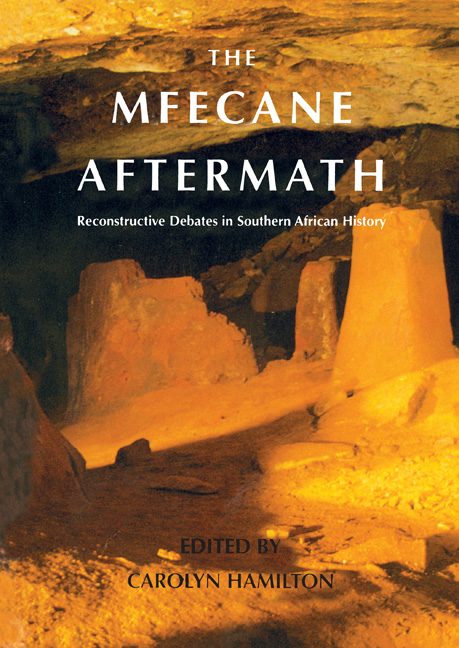Book contents
- Frontmatter
- Contents
- Maps
- Preface
- Acknowledgements
- Notes on Orthography and Names
- Contributors
- Introduction
- Part One Historiography and Methodology
- Part Two The South-Eastern Coastal Region
- Beyond the Concept of the ‘Zulu Explosion’ Comments on the Current Debate
- 5 Sources of Conflict in Southern Africa c. 1800-1830: The ‘Mfecane’ Reconsidered
- 6 Political Transformations in the Thukela-Mzimkhulu Region in the Late Eighteenth and Early Nineteenth Centuries
- 7 The Character and Objects of Chaka’: A Reconsideration of the Making of Shaka as Mfecane Motor
- 8 Matiwane's Road to Mbholompo: A Reprieve for the Mfecane?
- 9 Unmasking the Fingo: The War of 1835 Revisited
- 10 The Mfecane Survives its Critics
- Part Three The Interior
- Glossary
- Abbreviations
- Bibliographer's Note
- Bibliography
- Complete List of Papers Presented at the Colloquium
- Index
10 - The Mfecane Survives its Critics
from Part Two - The South-Eastern Coastal Region
Published online by Cambridge University Press: 31 May 2019
- Frontmatter
- Contents
- Maps
- Preface
- Acknowledgements
- Notes on Orthography and Names
- Contributors
- Introduction
- Part One Historiography and Methodology
- Part Two The South-Eastern Coastal Region
- Beyond the Concept of the ‘Zulu Explosion’ Comments on the Current Debate
- 5 Sources of Conflict in Southern Africa c. 1800-1830: The ‘Mfecane’ Reconsidered
- 6 Political Transformations in the Thukela-Mzimkhulu Region in the Late Eighteenth and Early Nineteenth Centuries
- 7 The Character and Objects of Chaka’: A Reconsideration of the Making of Shaka as Mfecane Motor
- 8 Matiwane's Road to Mbholompo: A Reprieve for the Mfecane?
- 9 Unmasking the Fingo: The War of 1835 Revisited
- 10 The Mfecane Survives its Critics
- Part Three The Interior
- Glossary
- Abbreviations
- Bibliographer's Note
- Bibliography
- Complete List of Papers Presented at the Colloquium
- Index
Summary
The term Mfecane has come to be widely accepted as a name for the process of political change and the accompanying wars and migrations which began in the area between the Thukela River and Delagoa Bay during the later part of the eighteenth century. Inter alia, this process resulted in the emergence of the Swazi and Zulu kingdoms, the founding of the Gaza kingdom in southern Mozambique, and the migrations and state-building activities of the Ndebele and of the Maseko and Zwangendaba's Ngoni.
The Mfecane as a Process of African State-building
In The Zulu Aftermath the Mfecane was presented as a positive process of political change in the direction of enlarged state power through improved military organisation and increased centralisation, and the expansion of the scale of political organisation through the rapid incorporation and assimilation of members of previously separate political communities. It was characterised as an essentially African revolution, the achievement of African leaders employing and modifying traditional institutions, values, weapons and tactics, rather than borrowing external models or techniques, in building their new kingdoms. It thus illustrated the capacity of African leaders for creative statecraft and the adaptability of traditional African institutions to new purposes. It demonstrated that the nineteenth-century history of Africa could not be adequately discussed simply in terms of external, predominantly European, forces acting on essentially passive African societies, but that it must be seen as a much more complex pattern involving reciprocal interaction between European and African initiatives.
The process of political change in the area inhabited by northern Nguni-speakers was described as beginning in the latter half of the eighteenth century in response to an intensification of intercommunity conflicts probably arising from heightened competition for grazing and garden land consequent upon population growth beyond what could be comfortably sustained within the area by traditional food production practices. The process involved an initial phase, dominated by Dingiswayo's Mthethwa and Zwide's Ndwandwe, in which the conversion of the corporate initiate-mate system to a means of military organisation and a device facilitating the incorporation of young males from other communities was implemented. The potential of this development, however, was not completely realised, in that the amabutho only assembled for fairly brief periods of active campaigning.
- Type
- Chapter
- Information
- Mfecane AftermathReconstructive Debates in Southern African History, pp. 277 - 298Publisher: Wits University PressPrint publication year: 1995



